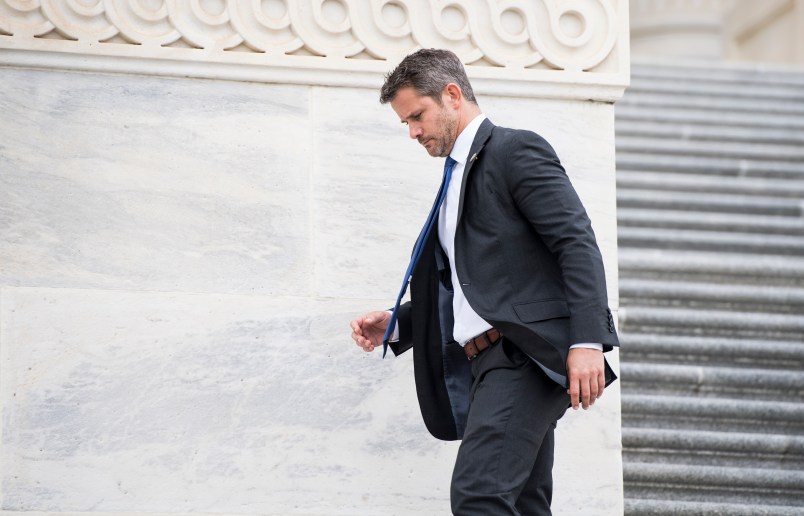House Minority Leader Kevin McCarthy (R-CA) is no longer a leader of the Republican party, as far as Rep. Adam Kinzinger (R-IL) is concerned.
He handed that power to former President Donald Trump during a pilgrimage to Mar-a-Lago weeks after a pro-Trump mob attacked the Capitol, leaving multiple people dead in the attempt to stop the 2020 election from being “stolen.”
“He had the opportunity after January 6 to, with Mitch McConnell, take the reins of the Republican party and be the leader and he handed those reins to Trump and revived him,” Kinzinger said Monday during a National Press Club event. “I don’t consider him to be speaking on behalf of the Republican party anymore because he gave his voting card, he gave his proxy card, to Donald Trump.”
But at one point, Kinzinger’s disillusionment with his leader stretched beyond personal disappointment. Kinzinger revealed that in the wake of the January 6 attack, he had actually talked with colleagues about holding a “no confidence” vote to boot McCarthy out of leadership.
He recalled talking about it with a “close group” of his colleagues, who concluded that their feeling was “no, let’s move on, we’re gonna vote to impeach the President and we need to move on.”
“Alright, well I’m not gonna do it alone — I still believe Kevin should have his leadership challenged,” Kinzinger said he responded to the group. “And then everyone went on the offense against Liz.”
Kinzinger painted the movement against Rep. Liz Cheney (R-WY), who is currently staring down the likely loss of her leadership position over her refusal to absolve Trump and her fellow Republicans of their election fraud lies, as “a brilliant strategic play” more than an organic groundswell against her. He credited outside groups, like the Freedom Club, with spearheading the shift, but framed it as a neat dodge that got McCarthy out of potential hot water.
He added that he estimates “maybe 10” of his GOP colleagues actually believe that the election was stolen and that some of them are “not really all that high IQ-ish on some things.” The remainder, he said, only spread it so they can keep being reelected.
Kinzinger pulled no punches against McCarthy throughout his remarks, saying that he had once considered McCarthy a “great friend,” but that he was “very disappointed” when he prioritized winning the majority over telling the truth about what happened on January 6.
He told an anecdote about a call with the GOP conference in the days before the January 6 attack. During it, he shared with McCarthy his serious concern about the potential for violence amid Trump’s attempt to discredit and overthrow the election. Kinzinger described McCarthy’s response as “cricket sounds” before the leader asked the operator for the next question.
“This was entirely predictable and it was disregarded,” Kinzinger said.
He also thwacked McCarthy for going on friendly media where he knows he won’t be asked about the election fraud lie.
Kinzinger’s message goes beyond his disdain for McCarthy though. Probably the House’s most outspoken anti-Trump Republican, he started up the Country First PAC for the express purpose of boosting GOP candidates who don’t support Trump and his election lies.
That effort fizzled out in a recent special election in Texas’s sixth district, where the candidate he and his group backed landed in ninth place with a paltry three percent of the vote. Kinzinger seemed unfazed by the loss Monday, describing his efforts to wrench his party back from Trump as a David and Goliath matchup until the movement grows.
He came across as a canary in a coal mine, not mincing words in the urgency he feels to, in Bidenesque language, “fight for the soul of the Republican party.” He described the slow corrosion of GOP ideology by “grievance” and “cancel culture,” as its leaders realized how powerfully motivating fear can be. While compelling, governing by fear has a deadly consequence, Kinzinger said — it “destroys democracies.”
An Air Force veteran, he compared American democracy to an aircraft running out of the speed needed to keep it aloft.
“In every aircraft, just before you stall, it buffets. It’s like a natural airframe shake to let you know, unintentionally frankly, that you’re about to fall out of the sky,” he said.
“That’s what January 6 was — it was a buffet.”



